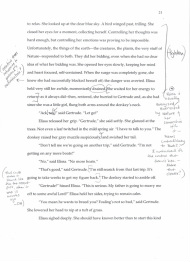
A bad editor will not do anything at all. Increasingly, editors – who are generally underpaid and overworked – simply don't want to put any time or effort into a manuscript. Like a homeowner who doesn't want to fix up a house before putting it on the market, they want to publish a book “as is.” Writers who have dealt with editors who are real sticklers may think this is sheer heaven. After all, editors who do nothing are great for an author's ego. But, believe it or not, there are errors in your manuscript – of internal logic, of grammar, and of sense. There always are. Trust me, you don't want your readers (or reviewers) to point out your mistakes.
Good editors are a dying breed, but great editors – ah, these are the ghosts of the past. A great editor not only gives his authors a run for their money, he brings out the best in them. A great editor puts his own ego aside (a rarity), and instead of adhering to a rule book (“Show, don't tell,” “Only one POV allowed”), follows the author's lead. Great authors break the rules, and great editors let them. A quick look at the rejection posts on this blog will give you an idea of what great authors have in common – and why editors/publishers (who were not up to their jobs) rejected them.
I had a good editor at RH. She forced me to examine everything in my manuscript – every chapter, every paragraph, every sentence, every word, every punctuation mark. I fought her every step of the way - and sometimes I was right. When I caved in to her insistence on following the rule book it robbed something from my story. But, more often than not, she was right. The trick to working with her was to understand what she was getting at, and then adjust my manuscript – slightly. In editing my first book - and this will always haunt me - I deleted too much. This is a common mistake for first-time authors. They throw the baby out with the bathwater.
I have learned through trial and error that the best way to work with editors is to walk the middle path. When they say “Jump,” don't ask “How high?” In other words, don't slavishly follow every suggestion. Use your judgment. On the other hand, don't, don't, don't tell them to sod-off – even mentally. They may be right. Take a step back from your manuscript, take a deep breath, and then exercise your skill as a writer. Make your manuscript shine as only you can – with their guidance. If the editor is good, the final product will be well worth it.
 RSS Feed
RSS Feed